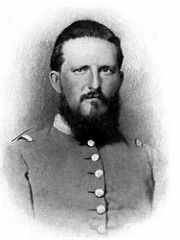Winchester, December 15, 1861.
Life in camp is generally dull with me, and I feel especially dull to-day. I have sometimes had a job, such as road-making at Centreville or my late excursion to the Potomac, which kept me busy enough; but these only happen now and then, and but for them my life would be idle enough, I am sure. When here in camp it really seems that I have no way of employing myself. I sometimes think I would prefer a more active campaign, winter as it is. With my stock of bed-clothes I think I could sleep quite comfortably even at this season in a fence corner, but it would not be so comfortable to the soldiers, who are not so well provided with such means of a comfortable night’s rest. If the weather continues open and the cold not too severe, I think it possible we may have some activity in our operations this winter. But of this no one can speak with any certainty but Jackson, and even he with but little, as his operations depend upon contingencies over which he has no control.
I sometimes look to the future with much despondency. I think most of our volunteers will quit the service when their year expires, and the news I get from Rockbridge gives me but little reason to hope that many more will volunteer to fill the places thus made vacant in our army. If they come at all, I fear it will be by compulsion. I fear there are more who are disposed to speculate off our present troubles, and turn them to pecuniary profit, than there are to sacrifice personal comfort and pecuniary interest and risk life itself for the promotion of our cause. My judgment dictates to me to pursue the path which I believe to be right, and to trust that the good deed may meet with its just reward. Nothing else could induce me to bear this sad separation from my darling wife and dear little children. This distresses me. I care nothing for the exposure and hardships of the service. But, Love, I should be more cheerful, and if sometimes oppressed with a feeling of sadness, should try to suppress it from you; for I should try and detract nothing from your happiness, which I fear I do in writing in so sad a strain.
And now, Love, good-bye. I shall be glad indeed to hear that you are out of your bed, and happier still to know, by a letter in your familiar hand, that you are nearly well and out of danger. When the winter sets in so cold that there can be no possible use for my services here, I shall try and get leave to spend a week with you at home. I don’t think that snow can keep off much longer.
